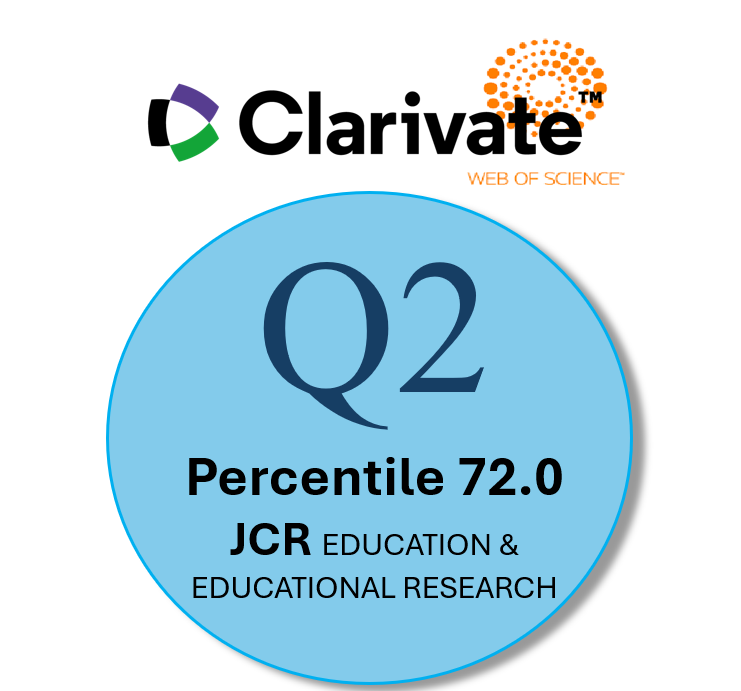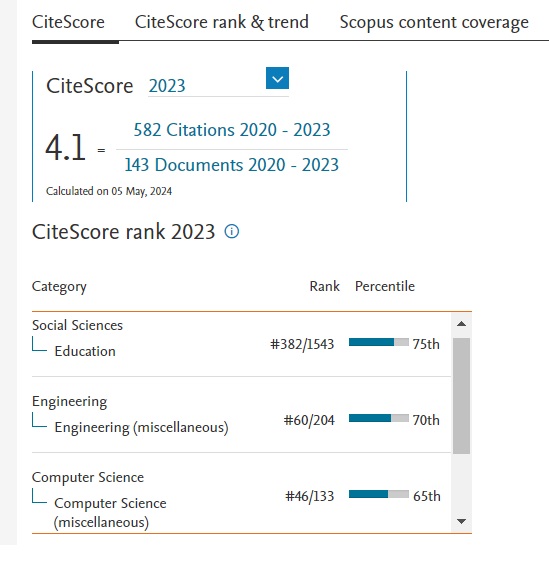Hacia una didáctica de la creación artística, educativa y cultural: el diseño instruccional de la asignatura Fundamentos de realización televisiva según los principios del marco educativo EDvolució
Resumen
El presente artículo propone como estudio de caso el diseño instruccional de la asignatura Fundamentos de realización televisiva, una materia troncal del grado en Comunicación Audiovisual en la Universitat Pompeu Fabra - Barcelona. Lo hace en el contexto de la puesta en marcha de un nuevo modelo educativo común llamado “EDvolució”, que pretende acentuar las dinámicas de aprendizaje activo del alumnado a través de la multiplicación de las experiencias de enseñanza, la práctica profesional, la inclusión de agentes sociales e industriales en el desarrollo de las asignaturas, el trabajo colaborativo y transdisciplinario, y la adquisición de competencias transversales, entre otros elementos. La particularidad de las materias relacionadas con las industrias creativas y culturales requiere de una aplicación excepcional de los principios que promueve EDvolució, al encontrarse en la intersección de ámbitos tecnológicos, artísticos y teóricos al mismo tiempo. Es por eso que el artículo expone, en primer lugar, cuáles son esas especificidades didácticas del sector en el que se incluye esta materia y qué enfoque disruptivo se le ha dado al caso en cuestión, y despliega, más adelante, cómo se propone su vínculo con EDvolució y cómo se desenvuelve concretamente su diseño instruccional.
Descargas
-
Resumen595
-
PDF496
Citas
Allegue, L., Jones, S., Kershaw, B., i Piccini, A. (eds). 2009. Practice-as-Research in performance and screen, Hampshire i New York: Palgrave MacMillan.
Bagheri, S., Kusters, R., Trienekens, J., i van der Zandt, H. (2016). Classification framework of knowledge transfer issues across value networks. Procedia CIRP, 47: 382-387.
Bergala, A. (2015). La création cinéma. Paris: Exhibitions.
Bermejo-Berros, J. (2021). The critical dialogical method in Educommunication to develop narrative thinking. Comunicar, 29: 67,
Campbell, M. (2021). Reimagining the creative industries in the community arts sector, Cultural Trends, February 2021.
Dovey, J. (2014). Screen media practice research and peer review, Journal of Media Practice, 8: 1, 63-70.
Loukkola, T., Dakovic, G. (2017). Learning and Teaching Paper #1. Thematic Groups 2017 Report. Brussel·les: European University Association.
Furco, A. (2011). Service-Learning: A Balanced Approach to Experiential Education. The International Journal for Global and Development Education Research, 1, 71–76.
Gill, A.S., Irwin, D.S., Ng, R.Y.-K., Towey, D., Wang, T. i Zhang, Y. (2020). The future of teaching post-COVID-19: Microlearning in product design education, Proceedings of 2020 IEEE International Conference on Teaching, Assessment, and Learning for Engineering, TALE 2020, 780-785.
Hegde, S., Karunasagar, I. (2021). Building Research Competence in Undergraduate Students. Resonance, 26, 3, 415-427.
Jódar-Marín, J.A. (2019). Los nuevos formatos audiovisuales en los cibermedios: del reportaje televisivo al videonews. Communication and Society, 32 (4), 63-75.
Juškevičienė, A., Dagienė, V., Dolgopolovas, V. (2021). Integrated activities in STEM environment: Methodology and implementation practice. Computer Applications in Engineering Education, 29 (1), 209-228.
Korhonen, N. (2017). Television director simulator : Multi-camera streaming application. Tesi extreta de https://www.theseus.fi/bitstream/handle/10024/125359/Thesis_Nikita_Korhonen.pdf?sequence=1&isAllowed=y
Livingston, S. (2004). Media Literacy and the Challenge of New Information and Communication Technologies, The Communication Review, 7, 1, 3-14.
Lutkenhaus, R.O., Jansz, J., Bouman, M.P.A. (2020). Toward spreadable entertainment-education: Leveraging social influence in online networks, Health Promotion International, 35: 5, 1241-1250.
Parker, J. (2008). Comparing Research and Teaching in University Promotion Criteria, Higher Education Quarterly, 62: 3, 237-251.
Paricio, J. (2020). Cinco principios para una formación del profesorado basada en la idea de Scholarship of Teaching and Learning (SoTL), a De Alba-Fernández, N. i Porlán, R. Docentes universitarios: una formación centrada en la práctica, Madrid: Morata.
Pinto, M.R., Viola, S., Onesti, A. i Ciampa, F. (2020).
Artists residencies, challenges and opportunities for communities’ empowerment and heritage. Sustainability, 12, 22:2, 1-20.
OECD. (2015). Education at a Glance Report. Paris: Organisation for Economic Co-operation and Development.
Paavola, S., Lipponen, L., Hakkaraien, K.. (2004). Models of Innovative Knowledge Communities and Three Metaphors of Learning. Review of Educational Research, 74, 557 -576.
Reynolds-Cuellar, J., Stump, G.S. i Bagiati, A. Building a Community for Educational Transformation in Higher Education. Proceedings - Frontiers in Education Conference, FIE, v. 2020.
Scolari, C. A. (2020). Cultura snack. Lo bueno, si breve… Buenos Aires: La Marca.
Sharples, M. Adams, A. Alozie, N., Ferguson, R. FitzGerald, E., Gaved, M., McAndrew, P., Means, B., Remold, J., Rienties, B., Roschelle, J., Vogt, K., Whitelock, D., Louise Yarnall. (2015). Innovating Pedagogy 2015. Exploring new forms of teaching, learning and assessment, to guide educators and policy makers. Londres: SRI Education, The Open University
Stoneman, P. (2010). Soft innovation: Changes in product aesthetics and aesthetic products. Oxford: Oxford University Press.
Syzdykova, Z., Koblandin, K., Mikhaylova, N. i Akinina, O. (2021). Assessment of E-Portfolio in Higher Education. International Journal of Emerging Technologies in Learning, Volume 16, Issue 2, 120-134.
Van Waveren, C., Oerlemans, L. i Pretorious, T. (2017). Refining the classification of knowledge transfer mechanisms for project-to-project knowledge sharing. South African Journal of Economic and Management Sciences, 20(1), 16-42.
Wellalage, N.H., Locke, S. (2020).
Formal credit and innovation: Is there a uniform relationship across types of innovation? International Review of Economics and Finance, 70, 1-15.
Zhang, Y. (2019). Scifotainment: Evolving multimodal engagement in online science news. Pragmatics and Beyond New Series, 301, 243-258.
Derechos de autor 2023 Revista de Educación a Distancia (RED)

Esta obra está bajo una licencia internacional Creative Commons Atribución-NoComercial 4.0.
Las obras que se publican en esta revista están sujetas a los siguientes términos:
1. El Servicio de Publicaciones de la Universidad de Murcia (la editorial) conserva los derechos patrimoniales (copyright) de las obras publicadas, y favorece y permite la reutilización de las mismas bajo la licencia de uso indicada en el punto 2.
2. Las obras se publican en la edición electrónica de la revista bajo una licencia Creative Commons Reconocimiento-NoComercial-SinObraDerivada 3.0 España (texto legal). Se pueden copiar, usar, difundir, transmitir y exponer públicamente, siempre que: i) se cite la autoría y la fuente original de su publicación (revista, editorial y URL de la obra); ii) no se usen para fines comerciales; iii) se mencione la existencia y especificaciones de esta licencia de uso.
3. Condiciones de auto-archivo. Se permite y se anima a los autores a difundir electrónicamente las versiones pre-print (versión antes de ser evaluada) y/o post-print (versión evaluada y aceptada para su publicación) de sus obras antes de su publicación, ya que favorece su circulación y difusión más temprana y con ello un posible aumento en su citación y alcance entre la comunidad académica. Color RoMEO: verde.














